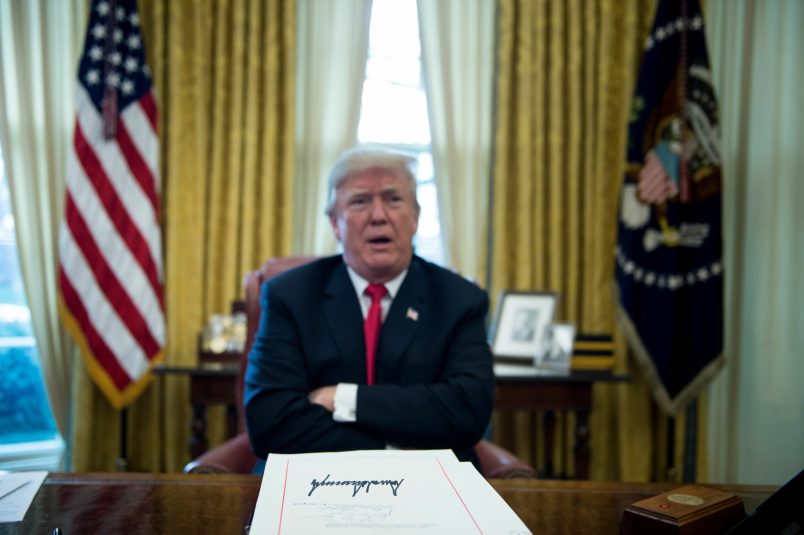For years during Trump’s presidency, the losers and haters wondered: might there be a conflict of interest in having a famously tax-averse President be audited by an IRS that he controlled?
Now, thanks to a report issued late Tuesday evening by the House Ways and Means Committee, we have an answer: yes.
The IRS dozed through most of its obligations to audit Trump during his presidency, the panel found, concluding that it violated an agency program which mandates that the tax returns of every President be audited annually. In Trump’s case, the returns weren’t audited for his first two years in office — when Republicans held a governing trifecta.
The revelation that the IRS was asleep at the wheel buttresses the argument that the committee used to justify its request for Trump’s returns: that if the IRS isn’t doing its job, Congress needs to know in order to consider legislation to fix the problem. And yet, for the aforementioned losers and haters who demanded scrutiny not only of Trump’s tax returns, but those of every President, it’s a hollow victory: Trump has been out of office for years, and the report shows largely that he escaped scrutiny of his finances while in power, thanks in part to his position of power.
After years of stonewalling and delay, the panel finally received Trump’s tax returns from the IRS last month. It voted on Tuesday to release the records themselves, with redactions, to the public.
Below are some key conclusions from the report:
- During the first two years of his administration, Trump filed his tax returns for 2015, 2016, and 2017. Per policy, but not statute, that should have triggered an automatic IRS audit.
- The IRS did not examine Trump’s personal tax returns for 2017, 2018, and 2019 until after he left office.
- The IRS only began to audit Trump at all under the program on the same day that the House Ways and Means Committee asked for Trump’s returns: April 3, 2019.
- Trump’s returns, as provided to the committee, were far less voluminous than expected.
- Trump delayed audits by filing FOIA requests, refusing to “provide all the facts needed to resolve certain issues,” and by threatening to appeal.
- The IRS recorded “animosity” between its representative and Trump’s attorneys in a memo, with Trump’s counsel purportedly expressing “dislike for our counsel” which “ma[d]e the examination a little more difficult.” Trump also described the IRS increasing its agents on the case from one to three as a “300 percent” increase in scrutiny.
- The IRS took exceedingly few steps to substantiate the returns that Trump filed, and never gained a complete picture of the business entities tied to Trump, nor did it determine all of the deductions that Trump claimed across his returns.
The report reveals that the IRS was stunningly lax in its treatment of Trump, but doesn’t go so far as to speculate on the cause: incompetence, fear, or corruption.
But Trump’s position as leader of the federal government — responsible for tax enforcement — is enough to tell the story. The panel cited the example of Richard Nixon, whose post-Watergate tax scandal sparked the informal tradition that all presidential candidates, save for Trump, have followed since: they publicly disclose their tax returns.
In Nixon’s case, the IRS gave him favorable treatment while he was in office. A congressional report subsequently resulted in Nixon back-paying taxes that he had been found to owe in excess of what the IRS originally determined.
Ways and Means Committee Chair Rep. Richard Neal (D-MA) advocated in the report for Congress to pass a law mandating the IRS publicly release the tax returns of Presidents and to conduct annual audits.







I’m not sure “asleep at the wheel” is the way to portray this. In time we’ll know but I’d bet a wad that this was preferential treatment by Trumpers in the IRS and probably on Trump’s demand. This is not an oversight.
“The report reveals that the IRS was stunningly lax in its treatment of Trump, but doesn’t go so far as to speculate on the cause: incompetence, fear, or corruption.”
I’ll vote. All three.
The more things change the more things remain the same. Nothing will be done to address this. The Republican won’t allow it and the media will blame the Democrats for not fixing it.
If anyone is surprised by any of this, they simply haven’t been paying attention.
I don’t doubt that the information is accurate, but how does the committee finally obtaining the actual tax returns inform them of whether audits were conducted or are currently in progress?